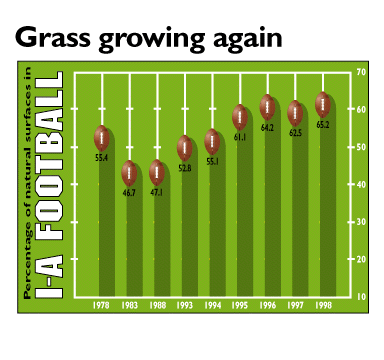
National Collegiate Athletic Association |
The NCAA News DigestAugust 17, 1998
GRASS GROWING AGAIN
The percentage of Division I-A institutions playing football on a natural surface is the highest it has been since the subdivision was established in 1978. The move toward grass actually declined in 1997, mostly because several institutions with artificial surfaces moved their programs from Division I-AA to I-A. This year, however, there were no additions to the subdivision nor was there any institution replacing a grass surface with an artificial one. Three institutions -- Baylor University; Indiana University, Bloomington; and the University of Louisville -- switched to natural surfaces. According to the 1998 edition of NCAA Football, the official record book of college football, Division I-A now contains 112 members, 73 of which (65.2 percent) play on a natural surface. The trend toward grass began in the mid '80s and has gained momentum since the beginning of this decade. Current Division I-A teams using grass surfaces Air Force, Alabama, Alabama-Birmingham, Arizona, Arizona State, Arkansas, Arkansas State, Auburn, Ball State, Baylor, Bowling Green, Brigham Young, California, Central Florida, Clemson, Colorado State, Duke, East Carolina, Florida, Florida State, Fresno State, Georgia, Georgia Tech, Indiana, Iowa, Iowa State, Kentucky, LSU, Louisiana Tech, Louisville, Maryland, Memphis, Miami (Florida), Miami (Ohio), Michigan, Mississippi, Mississippi State, Missouri, Navy, Nevada, New Mexico, New Mexico State, North Carolina, North Carolina State, Northeast Louisiana, Northwestern, Notre Dame, Ohio, Ohio State, Oklahoma, Penn State, Purdue, Rutgers, San Diego State, San Jose State, South Carolina, Southern California, Southern Methodist, Southern Mississippi, Southwestern Louisiana, Stanford, Tennessee, Texas, Texas A&M, Texas Christian, UCLA, Utah, Utah State, Virginia, Virginia Tech, Wake Forest, Western Michigan, Wyoming. Current Division I-A teams using artificial surfices Akron, Army, Boise State, Boston College, Central Michigan, Cincinnati, Colorado, Eastern Michigan, Hawaii, Houston, Idaho, Illinois, Kansas, Kansas State, Kent, Marshall, Michigan State, Minnesota, Nebraska, UNLV, North Texas, Northern Illinois, Oklahoma State, Oregon, Oregon State, Pittsburgh, Rice, Syracuse, Temple, Texas Tech, Toledo, Tulane, Tulsa, UTEP, Vanderbilt, Washington, Washington State, West Virginia, Wisconsin.
DIVISION IBoard provides for waivers on Sunday competition issues The Division I Board of Directors has amended Proposal No. 98-32, which will allow schools with written policies against competition on a particular day for religious reasons to have their needs accommodated while establishing a waiver process for a sports committee to appeal the rule if it believes the success of the championship might be compromised. The Board, which met August 11, also ap-proved expansion in five Division I sports, stipulating that such funding must be achieved through the reallocation of funds currently budgeted for Division I championships expenses and/or other available funds. The Board also acted on a proposal put forth by the Management Council for the creation of a task force to undertake a broad-based study of basketball issues in Division I. Staff contact: Stephen R. Morgan.
DIVISION IISeventeen institutions approved for active membership The Division II Management Council has approved 17 institutions for active membership and also has approved provisional memberships for 26 other institutions. The Council, which met July 27-29, also has asked the NCAA Executive Committee to review legislation that would permit Simon Fraser College, a Canadian institution, to become an NCAA member. In another matter, the Management Council and the Division II Presidents Council, which met August 11, have moved closer to a decision on how to distribute Division II's $3 million enhancement fund. Staff contact: Nancy L. Mitchell.
Division IIIMeeting focuses on selection principles for championships Selection principles for Division III Championships took center stage as the Division III Management Council amended recommendations from the division's Championships Committee, suggesting changes to reflect concerns raised by the membership and to provide greater guidance for the sports committees. The proposed selection principles are significant in Division III because, if enacted, they will emphasize regional and conference competition over other competition, thus reflecting the overall Division III philosophy and providing for a more consistent interpretation by the different sports committees. The proposed changes would become effective during the 1999-2000 academic year. Staff contact: Daniel T. Dutcher.
|
